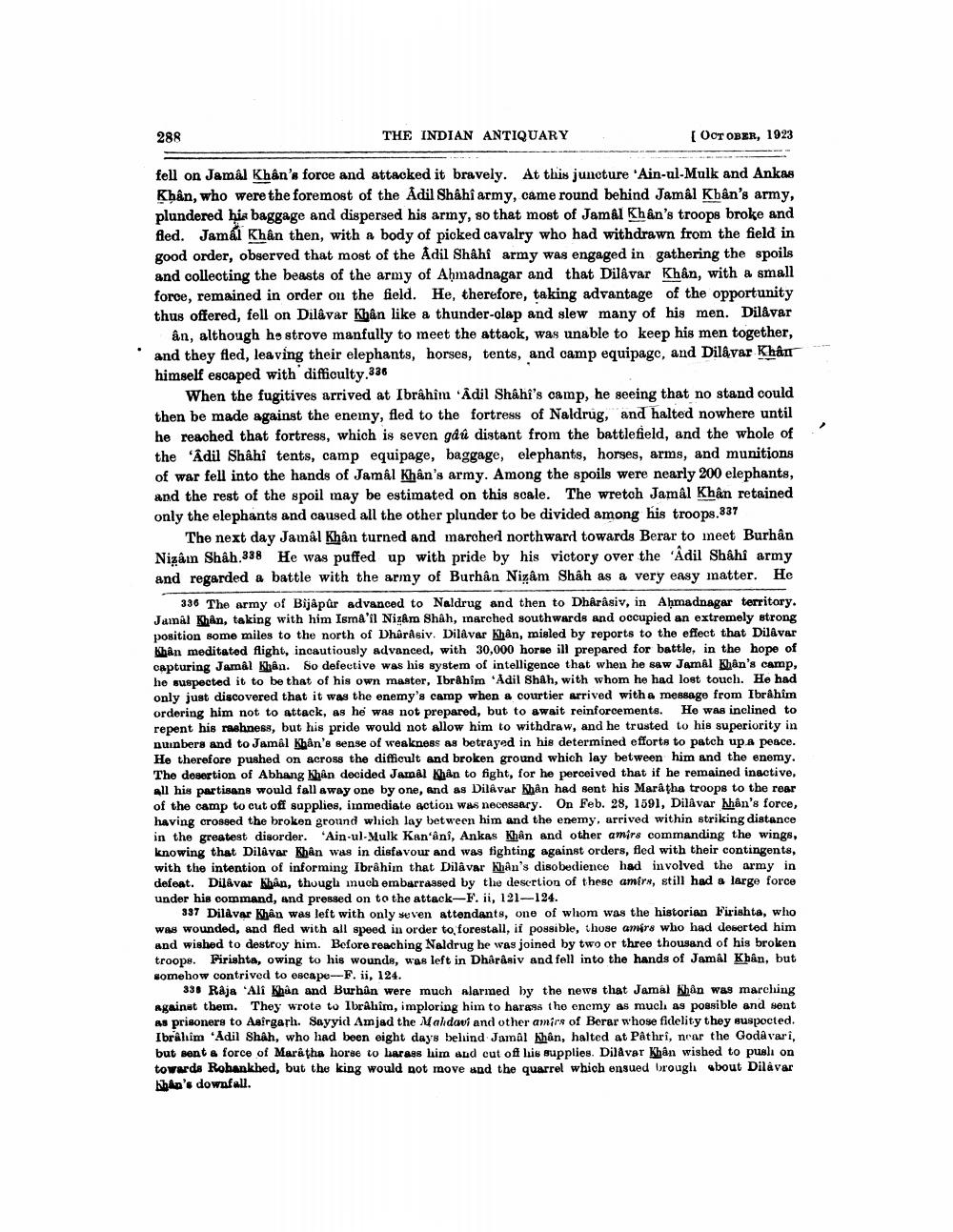________________
.
288
THE INDIAN ANTIQUARY
[ OCTOBER, 1923
fell on Jamal Khân's force and attacked it bravely. At this juncture 'Ain-ul-Mulk and Ankas Khân, who were the foremost of the Adil Shâhî army, came round behind Jamâl Khân's army, plundered his baggage and dispersed his army, so that most of Jamal Khân's troops broke and fled. Jamal Khan then, with a body of picked cavalry who had withdrawn from the field in good order, observed that most of the Adil Shâhî army was engaged in gathering the spoils and collecting the beasts of the army of Ahmadnagar and that Dilâvar Khân, with a small force, remained in order on the field. He, therefore, taking advantage of the opportunity thus offered, fell on Dilâvar Khân like a thunder-olap and slew many of his men. Dilåvar ân, although he strove manfully to meet the attack, was unable to keep his men together, and they fled, leaving their elephants, horses, tents, and camp equipage, and Dilâvar Khân himself escaped with difficulty,336
When the fugitives arrived at Ibrâhîm 'Adil Shâhî's camp, he seeing that no stand could then be made against the enemy, fled to the fortress of Naldrug, and halted nowhere until he reached that fortress, which is seven gâû distant from the battlefield, and the whole of the 'Adil Shâhî tents, camp equipage, baggage, elephants, horses, arms, and munitions of war fell into the hands of Jamal Khân's army. Among the spoils were nearly 200 elephants, and the rest of the spoil may be estimated on this scale. The wretch Jamâl Khân retained only the elephants and caused all the other plunder to be divided among his troops.337
The next day Jamâl Khân turned and marched northward towards Berar to meet Burhân. Nizam Shah.338 He was puffed up with pride by his victory over the Adil Shâhî army and regarded a battle with the army of Burhân Nizâm Shâh as a very easy matter. He
336 The army of Bijapûr advanced to Naldrug and then to Dhârâsiv, in Ahmadnagar territory. Jamal Khan, taking with him Ismâ'il Nizam Shah, marched southwards and occupied an extremely strong position some miles to the north of Dhârâsiv. Dilâvar Khân, misled by reports to the effect that Dilavar Khân meditated flight, incautiously advanced, with 30,000 horse ill prepared for battle, in the hope of capturing Jamal Khân. So defective was his system of intelligence that when he saw Jamal Khan's camp, he suspected it to be that of his own master, Ibrahim 'Adil Shah, with whom he had lost touch. He had only just discovered that it was the enemy's camp when a courtier arrived with a message from Ibrâhîm ordering him not to attack, as he was not prepared, but to await reinforcements. He was inclined to repent his rashness, but his pride would not allow him to withdraw, and he trusted to his superiority in numbers and to Jamal Khan's sense of weakness as betrayed in his determined efforts to patch up a peace. He therefore pushed on across the difficult and broken ground which lay between him and the enemy. The desertion of Abhang Khân decided Jamal Khan to fight, for he perceived that if he remained inactive, all his partisans would fall away one by one, and as Dilêvar Khan had sent his Maratha troops to the rear of the camp to cut off supplies, immediate action was necessary. On Feb. 28, 1591, Dilâvar hhân's force, having crossed the broken ground which lay between him and the enemy, arrived within striking distance in the greatest disorder. 'Ain-ul-Mulk Kan'ânî, Ankas Khân and other amirs commanding the wings, knowing that Dilavar Khan was in disfavour and was fighting against orders, fled with their contingents, with the intention of informing Ibrahim that Dilavar Khan's disobedience had involved the army in defeat. Dilavar Khan, though much embarrassed by the desertion of these amirs, still had a large force under his command, and pressed on to the attack-F. ii, 121-124.
337 Dilavar Khan was left with only seven attendants, one of whom was the historian Firishta, who was wounded, and fled with all speed in order to forestall, if possible, those amers who had deserted him and wished to destroy him. Before reaching Naldrug he was joined by two or three thousand of his broken troops. Firishta, owing to his wounds, was left in Dhârâsiv and fell into the hands of Jamal Khân, but somehow contrived to escape-F. ii, 124.
338 Raja Ali Khan and Burhûn were much alarmed by the news that Jamal Khan was marching against them. They wrote to Ibrahim, imploring him to harass the enemy as much as possible and sent as prisoners to Asirgarh. Sayyid Amjad the Mahdavi and other amirs of Berar whose fidelity they suspected. Ibrahim 'Adil Shah, who had been eight days behind Jamal Khân, halted at Pâthri, near the Godavari, but sent a force of Maratha horse to harass him and cut off his supplies. Dilavar Khan wished to pusli on towards Robankhed, but the king would not move and the quarrel which ensued brough about Dilavar Khan's downfall.




